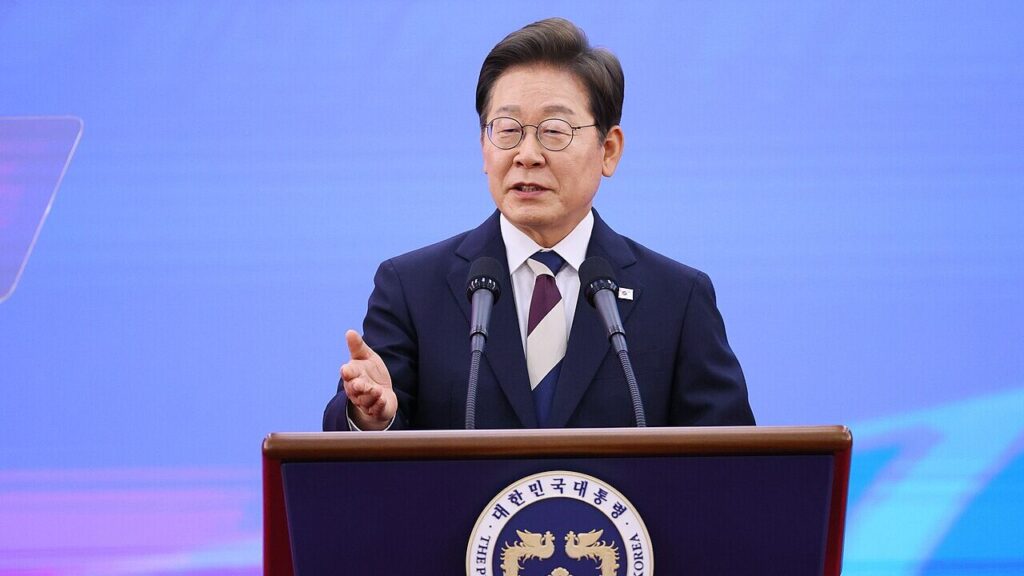South Korea’s newly elected president, Lee Jae-myung, has made it clear that de-escalating tensions with North Korea is a top priority. This diplomatic shift could pave the way for renewed dialogue between former U.S. President Donald Trump and North Korean leader Kim Jong-un, especially in a world fraught with geopolitical challenges. The announcement comes amid global instability and stalled U.S. diplomatic efforts in other regions.
During President Trump’s inaugural ball on January 20, 2025, he engaged in a video call with U.S. troops stationed at Camp Humphreys in South Korea. In a moment that caught many by surprise, Trump inquired about Kim Jong-un, remarking, “How’s Kim Jong-un doing? Although I developed a pretty good relationship with him, he’s a tough cookie.” This statement hinted at Trump’s ongoing interest in rekindling talks with Kim, a sentiment he has expressed since his presidential campaign.
Will There Be Another Trump-Kim Jong-un Summit?
Even if Trump is eager to meet Kim Jong-un, the security landscape he faces now is markedly different from his first term. In 2018, South Korea played a crucial role in facilitating the historic summit between the U.S. and North Korea, acting as a mediator and helping to ease tensions on the Korean Peninsula. However, under the previous administration of President Yoon Seok-yeol, inter-Korean relations deteriorated significantly, raising fears of potential conflict.
On June 3, Lee Jae-myung of the Democratic Party became South Korea’s new president following the Constitutional Court’s decision to remove President Yoon for illegal actions. Lee’s presidency is expected to stabilize domestic issues and reduce proliferation risks, creating a strategic environment conducive to renewed U.S.-North Korea negotiations.
Challenges in U.S. Foreign Policy
Despite Trump’s signals of wanting to resume dialogue with North Korea, other pressing international issues have taken precedence. The ongoing Ukraine-Russia war, unresolved Iran nuclear talks, and the Israel-Hamas conflict have diverted attention and resources. Trump had pledged to resolve the Ukraine conflict swiftly, but progress has been hampered by persistent discord between Ukraine and Russia.
Meanwhile, the Israel-Hamas conflict remains unresolved, with tensions escalating after Israel’s attack on Iran on June 13, followed by Iran’s retaliatory missile launches. These complex issues have overshadowed the North Korean situation, but Lee’s diplomatic efforts could shift the focus back to the Korean Peninsula.
Fragile Inter-Korean Relations
Over the past three years, tensions between North and South Korea have escalated, with diplomatic channels severed and hostile rhetoric exchanged. In early 2023, Kim Jong-un labeled South Korea a “principal enemy” and dismantled symbols of potential reunification, including roads and railways, while constructing border walls in the Demilitarized Zone.
Recognizing the growing nuclear threat from North Korea, then-presidential candidate Lee Jae-myung emphasized the importance of U.S. extended deterrence and diplomacy. During his campaign, Lee pledged to restore communication channels with North Korea and reduce provocative actions, a promise he has begun to fulfill since taking office.
On June 9, the Unification Ministry called for the suspension of propaganda balloon launches, a move aimed at preventing security escalations and protecting border residents.
Following Lee’s directive, South Korea halted its loudspeaker broadcasts, prompting a reciprocal response from North Korea. The Defense Ministry has also presented plans to restore the Comprehensive Military Agreement, further easing tensions.
The Nuclearization Debate
Under Lee’s leadership, South Korea’s stance on nuclear weaponization is expected to shift. The previous administration had entertained the idea of nuclear options, but Lee and his Democratic Party have consistently advocated for denuclearization on the Korean Peninsula.
In 2022, Lee opposed the redeployment of U.S. tactical nuclear weapons, emphasizing that “any form of nuclear weapons is unnecessary as long as extended deterrence exists through cooperation between South Korea and the U.S.” This position has remained firm despite provocations and debates within political circles.
With Lee’s presidency, the focus is on reducing nuclear tensions and fostering a stable environment for potential Trump-Kim dialogues. As the U.S. navigates complex international challenges, the Korean Peninsula offers a unique opportunity for diplomatic progress.
As Lee Jae-myung and Donald Trump potentially prepare for a summit, the focus will be on developing a pragmatic strategy centered on risk reduction and mutual restraint. The outcome of these efforts could significantly influence the future of U.S.-North Korea relations and regional stability.
